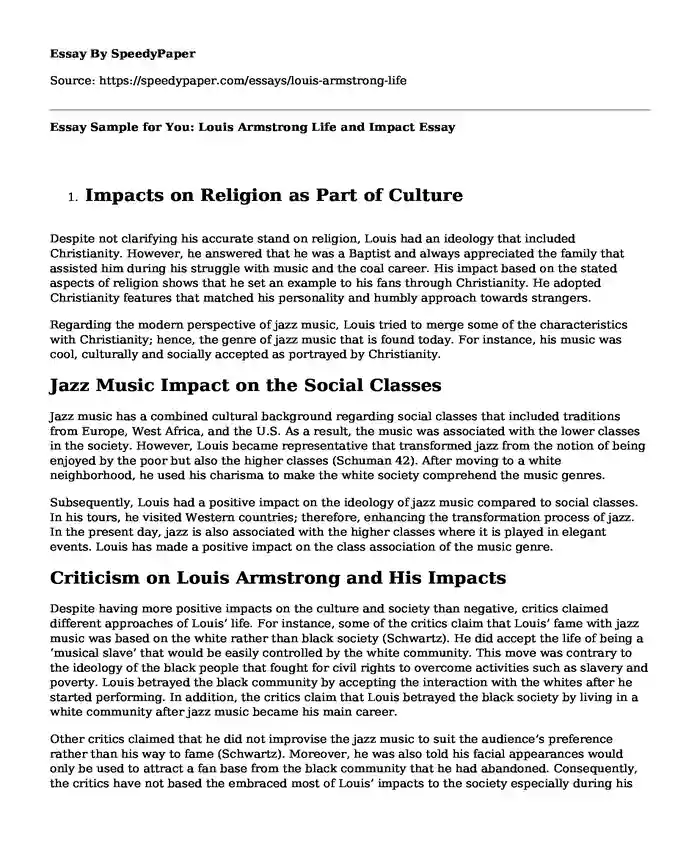
| Type of paper: | Essay |
| Categories: | Music Biography Personality Christianity |
| Pages: | 3 |
| Wordcount: | 760 words |
-
Impacts on Religion as Part of Culture
Despite not clarifying his accurate stand on religion, Louis had an ideology that included Christianity. However, he answered that he was a Baptist and always appreciated the family that assisted him during his struggle with music and the coal career. His impact based on the stated aspects of religion shows that he set an example to his fans through Christianity. He adopted Christianity features that matched his personality and humbly approach towards strangers.
Regarding the modern perspective of jazz music, Louis tried to merge some of the characteristics with Christianity; hence, the genre of jazz music that is found today. For instance, his music was cool, culturally and socially accepted as portrayed by Christianity.
Jazz Music Impact on the Social Classes
Jazz music has a combined cultural background regarding social classes that included traditions from Europe, West Africa, and the U.S. As a result, the music was associated with the lower classes in the society. However, Louis became representative that transformed jazz from the notion of being enjoyed by the poor but also the higher classes (Schuman 42). After moving to a white neighborhood, he used his charisma to make the white society comprehend the music genres.
Subsequently, Louis had a positive impact on the ideology of jazz music compared to social classes. In his tours, he visited Western countries; therefore, enhancing the transformation process of jazz. In the present day, jazz is also associated with the higher classes where it is played in elegant events. Louis has made a positive impact on the class association of the music genre.
Criticism on Louis Armstrong and His Impacts
Despite having more positive impacts on the culture and society than negative, critics claimed different approaches of Louis’ life. For instance, some of the critics claim that Louis’ fame with jazz music was based on the white rather than black society (Schwartz). He did accept the life of being a ‘musical slave’ that would be easily controlled by the white community. This move was contrary to the ideology of the black people that fought for civil rights to overcome activities such as slavery and poverty. Louis betrayed the black community by accepting the interaction with the whites after he started performing. In addition, the critics claim that Louis betrayed the black society by living in a white community after jazz music became his main career.
Other critics claimed that he did not improvise the jazz music to suit the audience’s preference rather than his way to fame (Schwartz). Moreover, he was also told his facial appearances would only be used to attract a fan base from the black community that he had abandoned. Consequently, the critics have not based the embraced most of Louis’ impacts to the society especially during his era.
Personal Reflection
A review of the research paper on the discussed icon (Louis Armstrong) has presented me with the notion that he tried his best to have a positive and equal impact to the society. His impacts both socially and culturally have grown in the present day more that he could have imagined during his era. He has also made major contributions to the jazz genre that has not faded after his death due to the deep traditions that the genre was founded on during the early 1900s. Other music genres have been incorporated or presented through jazz performances.
Conclusion
Louis Armstrong’s choice of discussion has presented direct and indirect impacts on the music industry. Louis’ contribution both socially and culturally were recognized globally in 1977 after his house was declared a National Historic Landmark whereby it is current a museum. Consequently, fans that heard about his music but did not have access to his music and personal information may visit the museum where they can get access. The museum has become a major landmark where present and future fans of jazz music can research and learn more about him.
Works Cited
Brothers, Thomas. Louis Armstrong's New Orleans. New York: W.W. Norton, 2006. Print.
"Louis Armstrong, The Entertainer Who Epitomized Jazz". Nytimes.com. N.p., 2016. Web. 12 Oct. 2016.
Prouty, Ken. "Reviewed Work: Music Is My Life: Louis Armstrong, Autobiography, And American Jazz By Daniel Stein". Fontes Artis Musicae 60.4 (2013): 359-361. Print.
Schuman, Michael. Louis Armstrong: Jazz Is Played From The Heart. Berkeley Heights, NJ: Enslow Publishers, 2008. Print.
Schwartz, Ben. "What Louis Armstrong Really Thinks - The New Yorker". The New Yorker. N.p., 2014. Web. 12 Oct. 2016.
Cite this page
Essay Sample for You: Louis Armstrong Life and Impact. (2017, Nov 11). Retrieved from https://speedypaper.com/essays/louis-armstrong-life
Request Removal
If you are the original author of this essay and no longer wish to have it published on the SpeedyPaper website, please click below to request its removal:
- Argumentative Essay on Abortion, Free Sample for Everyone
- Essay Example on the United Nations Operation in Burundi
- Free Essay: Development of My Entrepreneurial Capabilities and Future Planned Goals
- Research Proposal Paper for Free: Correctional Officers and Juveniles with Mental Illnesses
- Free Essay on International Business and Trade Policies
- Dentistry Essay Example: The Properties of Chlorhexidine Diacetate Mucoadhesive Buccal Tablet
- Free Essay. Critical Examination of Resources Utilization at Omantel Company
Popular categories




